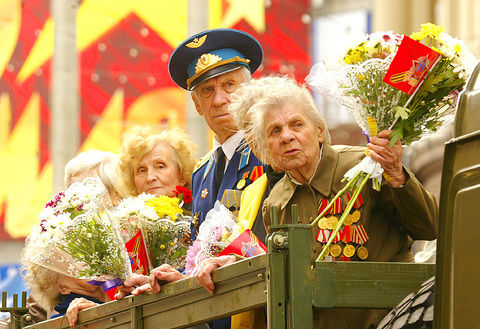Soldiers marched and medal-bedecked veterans waved from military trucks rolling down a main Moscow street yesterday, as Russia began a pomp-filled, high-security celebration of the 60th anniversary of the Allied victory over Nazi Germany.
About half a dozen tanks, including at least one World War II-era T-34, stood on a street near Red Square, awaiting today's military parade, which will be watched by the foreign guests. The pavement was marked by tank tracks.
Dozens of foreign leaders have been invited to the ceremonies, prompting some of the strictest security measures Moscow has seen.

PHOTO: AP
City authorities have long been urging Muscovites to leave town over the weekend, as some parts of the city center as well as roads leading to the city's airports were blocked off and accessible only to people with special passes.
Yesterday, gray-haired veterans rode on open military trucks down Moscow's main thoroughfare to Byelorussky railway station, where a train was pulled by a period locomotive in a recreation of the arrival trains bearing victorious Soviet troops back from the war.
As in 1945, the front of the locomotive bore a big portrait of a smiling Josef Stalin, the Soviet leader whose legacy is hanging over the anniversary celebrations. Many Russians feel he was the driving force behind the victory, while others revile him as a dictator who killed millions of his own citizens and say the Soviet people won the war despite his mistakes.
The 60 veterans aboard the train were greeted on the platform by women in traditional Russian costumes and war-era clothes, as well as by Moscow Mayor Yuri Luzhkov. They were led into the square outside the station, where some waltzed as they awaited a concert in their honor.
"Today is a great day. Our victory meant that we could live and study," said Alexander Roshin, 79, a veteran who was aboard the train.
Another veteran, 80-year-old Vera Minayeva, expressed anger at economic hardship in today's Russia.
On the way to the station, soldiers stomped alongside the veterans in trucks as Russians lining the street, holding flags and balloons, chanted "Thank you" and shouted congratulations.
also see story:
Bush pays tribute to fallen soldiers

DAREDEVIL: Honnold said it had always been a dream of his to climb Taipei 101, while a Netflix producer said the skyscraper was ‘a real icon of this country’ US climber Alex Honnold yesterday took on Taiwan’s tallest building, becoming the first person to scale Taipei 101 without a rope, harness or safety net. Hundreds of spectators gathered at the base of the 101-story skyscraper to watch Honnold, 40, embark on his daredevil feat, which was also broadcast live on Netflix. Dressed in a red T-shirt and yellow custom-made climbing shoes, Honnold swiftly moved up the southeast face of the glass and steel building. At one point, he stepped onto a platform midway up to wave down at fans and onlookers who were taking photos. People watching from inside

A Vietnamese migrant worker yesterday won NT$12 million (US$379,627) on a Lunar New Year scratch card in Kaohsiung as part of Taiwan Lottery Co’s (台灣彩券) “NT$12 Million Grand Fortune” (1200萬大吉利) game. The man was the first top-prize winner of the new game launched on Jan. 6 to mark the Lunar New Year. Three Vietnamese migrant workers visited a Taiwan Lottery shop on Xinyue Street in Kaohsiung’s Gangshan District (崗山), a store representative said. The player bought multiple tickets and, after winning nothing, held the final lottery ticket in one hand and rubbed the store’s statue of the Maitreya Buddha’s belly with the other,

‘NATO-PLUS’: ‘Our strategic partners in the Indo-Pacific are facing increasing aggression by the Chinese Communist Party,’ US Representative Rob Wittman said The US House of Representatives on Monday released its version of the Consolidated Appropriations Act, which includes US$1.15 billion to support security cooperation with Taiwan. The omnibus act, covering US$1.2 trillion of spending, allocates US$1 billion for the Taiwan Security Cooperation Initiative, as well as US$150 million for the replacement of defense articles and reimbursement of defense services provided to Taiwan. The fund allocations were based on the US National Defense Authorization Act for fiscal 2026 that was passed by the US Congress last month and authorized up to US$1 billion to the US Defense Security Cooperation Agency in support of the

‘COMMITTED TO DETERRENCE’: Washington would stand by its allies, but it can only help as much as countries help themselves, Raymond Greene said The US is committed to deterrence in the first island chain, but it should not bear the burden alone, as “freedom is not free,” American Institute in Taiwan Director Raymond Greene said in a speech at the Institute for National Defense and Security Research’s “Strengthening Resilience: Defense as the Engine of Development” seminar in Taipei yesterday. In the speech, titled “Investing Together and a Secure and Prosperous Future,” Greene highlighted the contributions of US President Donald Trump’s administration to Taiwan’s defense efforts, including the establishment of supply chains for drones and autonomous systems, offers of security assistance and the expansion of